
Going into the back-end of the new civilizations presented in Brave New World, here is another strategy posts. This time, I'll be discussing the gold-generating machine that is Portugal.
The Portuguese essentially initiated the European "Age of Discovery" through the efforts and patronage of Henry the Navigator. After exploring Atlantic islands, Africa, and South America, Portugal established the first world empire in Europe and became one of the wealthiest and most influential powers of the era. Portugal lost much of its imperial strength due to wars with Napoleon and after its most significant colony, Brazil, declared independence. Portugal would never regain its former glory, but it still maintained control over many trading colonies up through the nineteenth century through the use of Feitoria (fortified factory complexes) in its colonies, which are represented in Civ V as City-States.
Maria I was the first undisputed queen regnant of Portugal and was crowned in 1777. Her rule was tarnished by mental instability and dementia that was first noticed in 1786 and which had made her incapable of managing affairs of state by 1792. The following decade, wars broke out with Spain and Napoleonic France, and Maria (along with the entire royal court) was moved to the colony of Brazil. Despite her madness, she is well-regarded among both Portuguese and Brazilian historians for her domestic policies and for supporting Brazilian independence. she is known as "Maria the Pious" in Portugal, and "Maria the Mad" in Brazil due to the fact that her mental state had already deteriorated by the time she had been relocated to Brazil, and her son had to perform most duties of state.

Banner courtesy of Chichian.
Portuguese uniques in Civilization V: Brave New World

Portugal is exclusively focused on being a sea-based trade empire. They have an opportunity to acquire many more luxuries than other civs while requiring minimal expansion. Much like Morocco, they favor a diplomatic turtle strategy, but with a slightly more pro-active Renaissance period.
Mare Clausum ["Closed Seas"]
"Resource diversity grants twice as much gold for Portugal in Trade Routes."

Normally, each distinct luxury or strategic resource that a city has will add 0.5 gold to a particular trade route involving that city (before any modifiers). With Mare Clausum, that value is increased to a full 1 gold per distinct resource (before any modifiers are applied). An average trade route will usually have four to six unique resources, so that's a bonus 2 to 3 base gold for each Portuguese trade route - before adding modifiers such as +25% for river adjacency or 2x for being a sea route.
This bonus only applies to trade routes originating in Portuguese cities, and does not benefit other civs the way that Morocco's trait does. Bonus resources such as wheat, bananas, cows, sheep, deer, stone, and fish do not count towards trade route gold, and so are irrelevant to Mare Clausum.
The rules for whether a resource "belongs" to a city can be a bit confusing. As far as I understand it, a resource is "near" a city if that city was the first city (belonging to the civ that owns the resource's tile) to annex the resource into its workable radius. This means that if more than one city overlaps the same resource, only the first city to "own" the resource will get credit for having it. I believe the rules for resource-enhancing buildings (such as Stables, Mints, Seaports, etc) is the same. This means that you cannot set up your cities so that they overlap a bunch of resources, assign them all to one city in order to have a bunch of civs send trade routes to that city, and then re-assign those resources to nearby cities (thus lowering the income that the other civs receive from those trade routes).
Mercantile city states can make for very profitable trade partners for Portugal (especially early) because they start the game with free access to a unique luxury (porcelain or jewelry).
Nau (a.k.a. Carrack)
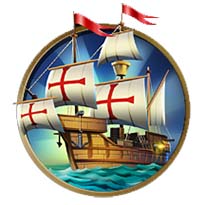
Game Info: "Melee naval unit which excels at sea exploration. It has more moves than the Caravel, which it replaces, and can perform a one-time ability next to foreign lands to earn gold and XP. May only be built by the Portuguese."
Civilopedia Strategy: "This melee naval unit replaces the Caravel and is skilled at exploration. When it is in a tile next to land owned by another Civilization or City-State you are at peace with, it may perform a one-time trade mission to earn gold old and XP. The further the land is from your own capital, the greater the bonus, so it is best to use on distant players. Use this unit to explore the map and uncover the locations of other players."
Replaces: Caravel
Requirements: Astronomy technology, and 1 gold per turn maintenance
Obsoleted: Steam Power technology (same as Caravel)
Cost: 120 Production / 600 Gold [Standard speed] (same as Caravel)

Attack Type: Melee, Combat Class: Naval Melee, Strength: 20 (same as Caravel)
Movement Speed: 5 (+1 from Caravel).
Bonuses: +1 sight and can withdraw from melee (same as Caravel).
Exotic Cargo promotion: May sell "Exotic Goods" when adjacent to a foreign (civilization or city state) tile to gain gold and experience based on distance from capital. May only be used once per unit. This promotion is retained upon upgrade, but cannot be reused after it was already spent.
The Nau does not receive any combat bonuses. It does have higher speed (5 instead of 4), so it can outmaneuver rival ships, and you can use the extra speed to set up flanking bonuses more easily. It's not at all effective at attacking cities.
The major perk of the Nau is a one-time ability to "sell cargo" when it is adjacent (or within) foreign territory (either a city state or a civilization). The amount of gold and experience received varies based on the distance of the Nau unit from the capital at the time that the ability is used. It is not affected by the respective wealth levels of Portugal or the foreign civilization. Using this ability while the Nau is adjacent to more than one foreign civilization's borders does not grant any additional benefit.
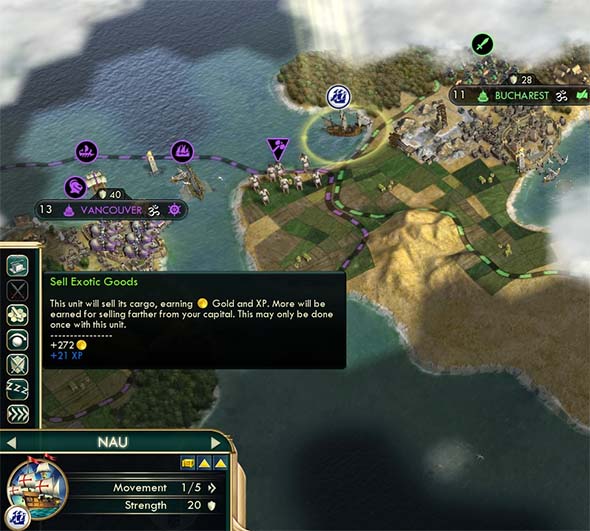
Being adjacent to more than one foreign nation's land does not change the value of the exotic cargo.
On standard map and speed settings, my Naus typically generated between 250 and 300 gold. This ability provides decent chunks of money mid-game, and it just about covers the cost of upgrading the unit. Don't bother buying Naus unless you really need one (for military purposes), as this will just be counterproductive to the ability. Build Naus as opposed to other units, and use the gold to purchase other units and buildings.
After using the Nau's Exotic Cargo ability, the promotion is not removed from the unit, but the "Sell Cargo" button will disappear from the interface.
Exotic Cargo Values
Exotic Cargo Output = FLOOR(min + (max-min)/iDistanceThreshold*T)
where:
T = Number of tiles away
iDistanceThreshold (Max Tile Distance) = (Map Width + Map Height) / 2
min = 100 for Gold, 10 for XP
max = 400 for Gold, 30 for XP
Nau Exotic Cargo by Map Size| Map | Size (tiles) | Max Tile
Distance | Formulas |
|---|
| + Duel | 40x24 | 32 | Gold = FLOOR(100 + 300/32*T)
XP = FLOOR(10 + 20/32*T) |
Duel Map Exotic Cargo Gold & XP| Tiles | Gold | XP |
|---|
| 1 | 109 | 10 | | 2 | 118 | 11 | | 3 | 128 | 11 | | 4 | 137 | 12 | | 5 | 146 | 13 | | 6 | 156 | 13 | | 7 | 165 | 14 |
| | Tiles | Gold | XP |
|---|
| 8 | 175 | 15 | | 9 | 184 | 15 | | 10 | 193 | 16 | | 11 | 203 | 16 | | 12 | 212 | 17 | | 13 | 221 | 18 | | 14 | 231 | 18 |
| | Tiles | Gold | XP |
|---|
| 15 | 240 | 19 | | 16 | 250 | 20 | | 17 | 259 | 20 | | 18 | 268 | 21 | | 19 | 278 | 21 | | 20 | 287 | 22 | | 21 | 296 | 23 |
| | Tiles | Gold | XP |
|---|
| 22 | 306 | 23 | | 23 | 315 | 24 | | 24 | 325 | 25 | | 25 | 334 | 25 | | 26 | 343 | 26 | | 27 | 353 | 26 | | 28 | 362 | 27 |
| | Tiles | Gold | XP |
|---|
| 29 | 371 | 28 | | 30 | 381 | 28 | | 31 | 390 | 29 | | 32 | 400 | 30 |
| |
| + Tiny | 56x36 | 46 | Gold = FLOOR(100 + 300/46*T)
XP = FLOOR(10 + 20/46*T) |
Tiny Map Exotic Cargo Gold & XP| Tiles | Gold | XP |
|---|
| 1 | 106 | 10 | | 2 | 113 | 10 | | 3 | 119 | 11 | | 4 | 126 | 11 | | 5 | 132 | 12 | | 6 | 139 | 12 | | 7 | 145 | 13 | | 8 | 152 | 13 | | 9 | 158 | 13 | | 10 | 165 | 14 |
| | Tiles | Gold | XP |
|---|
| 11 | 171 | 14 | | 12 | 178 | 15 | | 13 | 184 | 15 | | 14 | 191 | 16 | | 15 | 197 | 16 | | 16 | 204 | 16 | | 17 | 210 | 17 | | 18 | 217 | 17 | | 19 | 223 | 18 | | 20 | 230 | 18 |
| | Tiles | Gold | XP |
|---|
| 21 | 236 | 19 | | 22 | 243 | 19 | | 23 | 250 | 20 | | 24 | 256 | 20 | | 25 | 263 | 20 | | 26 | 269 | 21 | | 27 | 276 | 21 | | 28 | 282 | 22 | | 29 | 289 | 22 | | 30 | 295 | 23 |
| | Tiles | Gold | XP |
|---|
| 31 | 302 | 23 | | 32 | 308 | 23 | | 33 | 315 | 24 | | 34 | 321 | 24 | | 35 | 328 | 25 | | 36 | 334 | 25 | | 37 | 341 | 26 | | 38 | 347 | 26 | | 39 | 354 | 26 | | 40 | 360 | 27 |
| | Tiles | Gold | XP |
|---|
| 41 | 367 | 27 | | 42 | 373 | 28 | | 43 | 380 | 28 | | 44 | 386 | 29 | | 45 | 393 | 29 | | 46 | 400 | 30 |
| |
| + Small | 66x42 | 54 | Gold = FLOOR(100 + 300/54*T)
XP = FLOOR(10 + 20/54*T) |
Small Map Exotic Cargo Gold & XP| Tiles | Gold | XP |
|---|
| 1 | 105 | 10 | | 2 | 111 | 10 | | 3 | 116 | 11 | | 4 | 122 | 11 | | 5 | 127 | 11 | | 6 | 133 | 12 | | 7 | 138 | 12 | | 8 | 144 | 12 | | 9 | 150 | 13 | | 10 | 155 | 13 | | 11 | 161 | 14 |
| | Tiles | Gold | XP |
|---|
| 12 | 166 | 14 | | 13 | 172 | 14 | | 14 | 177 | 15 | | 15 | 183 | 15 | | 16 | 188 | 15 | | 17 | 194 | 16 | | 18 | 200 | 16 | | 19 | 205 | 17 | | 20 | 211 | 17 | | 21 | 216 | 17 | | 22 | 222 | 18 |
| | Tiles | Gold | XP |
|---|
| 23 | 227 | 18 | | 24 | 233 | 18 | | 25 | 238 | 19 | | 26 | 244 | 19 | | 27 | 250 | 20 | | 28 | 255 | 20 | | 29 | 261 | 20 | | 30 | 266 | 21 | | 31 | 272 | 21 | | 32 | 277 | 21 | | 33 | 283 | 22 |
| | Tiles | Gold | XP |
|---|
| 34 | 288 | 22 | | 35 | 294 | 22 | | 36 | 300 | 23 | | 37 | 305 | 23 | | 38 | 311 | 24 | | 39 | 316 | 24 | | 40 | 322 | 24 | | 41 | 327 | 25 | | 42 | 333 | 25 | | 43 | 338 | 25 | | 44 | 344 | 26 |
| | Tiles | Gold | XP |
|---|
| 45 | 350 | 26 | | 46 | 355 | 27 | | 47 | 361 | 27 | | 48 | 366 | 27 | | 49 | 372 | 28 | | 50 | 377 | 28 | | 51 | 383 | 28 | | 52 | 388 | 29 | | 53 | 394 | 29 | | 54 | 400 | 30 |
| |
| + Standard | 80x52 | 66 | Gold = FLOOR(100 + 300/66*T)
XP = FLOOR(10 + 20/66*T) |
Standard Map Exotic Cargo Gold & XP| Tiles | Gold | XP |
|---|
| 1 | 104 | 10 | | 2 | 109 | 10 | | 3 | 113 | 10 | | 4 | 118 | 11 | | 5 | 122 | 11 | | 6 | 127 | 11 | | 7 | 131 | 12 | | 8 | 136 | 12 | | 9 | 140 | 12 | | 10 | 145 | 13 | | 11 | 150 | 13 | | 12 | 154 | 13 | | 13 | 159 | 13 | | 14 | 163 | 14 |
| | Tiles | Gold | XP |
|---|
| 15 | 168 | 14 | | 16 | 172 | 14 | | 17 | 177 | 15 | | 18 | 181 | 15 | | 19 | 186 | 15 | | 20 | 190 | 16 | | 21 | 195 | 16 | | 22 | 200 | 16 | | 23 | 204 | 16 | | 24 | 209 | 17 | | 25 | 213 | 17 | | 26 | 218 | 17 | | 27 | 222 | 18 | | 28 | 227 | 18 |
| | Tiles | Gold | XP |
|---|
| 29 | 231 | 18 | | 30 | 236 | 19 | | 31 | 240 | 19 | | 32 | 245 | 19 | | 33 | 250 | 19 | | 34 | 254 | 20 | | 35 | 259 | 20 | | 36 | 263 | 20 | | 37 | 268 | 21 | | 38 | 272 | 21 | | 39 | 277 | 21 | | 40 | 281 | 22 | | 41 | 286 | 22 | | 42 | 290 | 22 |
| | Tiles | Gold | XP |
|---|
| 43 | 295 | 23 | | 44 | 300 | 23 | | 45 | 304 | 23 | | 46 | 309 | 23 | | 47 | 313 | 24 | | 48 | 318 | 24 | | 49 | 322 | 24 | | 50 | 327 | 25 | | 51 | 331 | 25 | | 52 | 336 | 25 | | 53 | 340 | 26 | | 54 | 345 | 26 | | 55 | 350 | 26 | | 56 | 354 | 26 |
| | Tiles | Gold | XP |
|---|
| 57 | 359 | 27 | | 58 | 363 | 27 | | 59 | 368 | 27 | | 60 | 372 | 28 | | 61 | 377 | 28 | | 62 | 381 | 28 | | 63 | 386 | 29 | | 64 | 390 | 29 | | 65 | 395 | 29 | | 66 | 400 | 30 |
| |
| + Large | 104x64 | 84 | Gold = FLOOR(100 + 300/84*T)
XP = FLOOR(10 + 20/84*T) |
Large Map Exotic Cargo Gold & XP| Tiles | Gold | XP |
|---|
| 1 | 103 | 10 | | 2 | 107 | 10 | | 3 | 110 | 10 | | 4 | 114 | 10 | | 5 | 117 | 11 | | 6 | 121 | 11 | | 7 | 125 | 11 | | 8 | 128 | 11 | | 9 | 132 | 12 | | 10 | 135 | 12 | | 11 | 139 | 12 | | 12 | 142 | 12 | | 13 | 146 | 13 | | 14 | 150 | 13 | | 15 | 153 | 13 | | 16 | 157 | 13 | | 17 | 160 | 14 |
| | Tiles | Gold | XP |
|---|
| 18 | 164 | 14 | | 19 | 167 | 14 | | 20 | 171 | 14 | | 21 | 175 | 15 | | 22 | 178 | 15 | | 23 | 182 | 15 | | 24 | 185 | 15 | | 25 | 189 | 15 | | 26 | 192 | 16 | | 27 | 196 | 16 | | 28 | 200 | 16 | | 29 | 203 | 16 | | 30 | 207 | 17 | | 31 | 210 | 17 | | 32 | 214 | 17 | | 33 | 217 | 17 | | 34 | 221 | 18 |
| | Tiles | Gold | XP |
|---|
| 35 | 225 | 18 | | 36 | 228 | 18 | | 37 | 232 | 18 | | 38 | 235 | 19 | | 39 | 239 | 19 | | 40 | 242 | 19 | | 41 | 246 | 19 | | 42 | 250 | 20 | | 43 | 253 | 20 | | 44 | 257 | 20 | | 45 | 260 | 20 | | 46 | 264 | 20 | | 47 | 267 | 21 | | 48 | 271 | 21 | | 49 | 275 | 21 | | 50 | 278 | 21 | | 51 | 282 | 22 |
| | Tiles | Gold | XP |
|---|
| 52 | 285 | 22 | | 53 | 289 | 22 | | 54 | 292 | 22 | | 55 | 296 | 23 | | 56 | 300 | 23 | | 57 | 303 | 23 | | 58 | 307 | 23 | | 59 | 310 | 24 | | 60 | 314 | 24 | | 61 | 317 | 24 | | 62 | 321 | 24 | | 63 | 325 | 25 | | 64 | 328 | 25 | | 65 | 332 | 25 | | 66 | 335 | 25 | | 67 | 339 | 25 | | 68 | 342 | 26 |
| | Tiles | Gold | XP |
|---|
| 69 | 346 | 26 | | 70 | 350 | 26 | | 71 | 353 | 26 | | 72 | 357 | 27 | | 73 | 360 | 27 | | 74 | 364 | 27 | | 75 | 367 | 27 | | 76 | 371 | 28 | | 77 | 375 | 28 | | 78 | 378 | 28 | | 79 | 382 | 28 | | 80 | 385 | 29 | | 81 | 389 | 29 | | 82 | 392 | 29 | | 83 | 396 | 29 | | 84 | 400 | 30 |
| |
| + Huge | 128x80 | 104 | Gold = FLOOR(100 + 300/104*T)
XP = FLOOR(10 + 20/104*T) |
Huge Map Exotic Cargo Gold & XP| Tiles | Gold | XP |
|---|
| 1 | 102 | 10 | | 2 | 105 | 10 | | 3 | 108 | 10 | | 4 | 111 | 10 | | 5 | 114 | 10 | | 6 | 117 | 11 | | 7 | 120 | 11 | | 8 | 123 | 11 | | 9 | 125 | 11 | | 10 | 128 | 11 | | 11 | 131 | 12 | | 12 | 134 | 12 | | 13 | 137 | 12 | | 14 | 140 | 12 | | 15 | 143 | 12 | | 16 | 146 | 13 | | 17 | 149 | 13 | | 18 | 151 | 13 | | 19 | 154 | 13 | | 20 | 157 | 13 | | 21 | 160 | 14 |
| | Tiles | Gold | XP |
|---|
| 22 | 163 | 14 | | 23 | 166 | 14 | | 24 | 169 | 14 | | 25 | 172 | 14 | | 26 | 175 | 15 | | 27 | 177 | 15 | | 28 | 180 | 15 | | 29 | 183 | 15 | | 30 | 186 | 15 | | 31 | 189 | 15 | | 32 | 192 | 16 | | 33 | 195 | 16 | | 34 | 198 | 16 | | 35 | 200 | 16 | | 36 | 203 | 16 | | 37 | 206 | 17 | | 38 | 209 | 17 | | 39 | 212 | 17 | | 40 | 215 | 17 | | 41 | 218 | 17 | | 42 | 221 | 18 |
| | Tiles | Gold | XP |
|---|
| 43 | 224 | 18 | | 44 | 226 | 18 | | 45 | 229 | 18 | | 46 | 232 | 18 | | 47 | 235 | 19 | | 48 | 238 | 19 | | 49 | 241 | 19 | | 50 | 244 | 19 | | 51 | 247 | 19 | | 52 | 250 | 20 | | 53 | 252 | 20 | | 54 | 255 | 20 | | 55 | 258 | 20 | | 56 | 261 | 20 | | 57 | 264 | 20 | | 58 | 267 | 21 | | 59 | 270 | 21 | | 60 | 273 | 21 | | 61 | 275 | 21 | | 62 | 278 | 21 | | 63 | 281 | 22 |
| | Tiles | Gold | XP |
|---|
| 64 | 284 | 22 | | 65 | 287 | 22 | | 66 | 290 | 22 | | 67 | 293 | 22 | | 68 | 296 | 23 | | 69 | 299 | 23 | | 70 | 301 | 23 | | 71 | 304 | 23 | | 72 | 307 | 23 | | 73 | 310 | 24 | | 74 | 313 | 24 | | 75 | 316 | 24 | | 76 | 319 | 24 | | 77 | 322 | 24 | | 78 | 325 | 24 | | 79 | 327 | 25 | | 80 | 330 | 25 | | 81 | 333 | 25 | | 82 | 336 | 25 | | 83 | 339 | 25 | | 84 | 342 | 26 |
| | Tiles | Gold | XP |
|---|
| 85 | 345 | 26 | | 86 | 348 | 26 | | 87 | 350 | 26 | | 88 | 353 | 26 | | 89 | 356 | 27 | | 90 | 359 | 27 | | 91 | 362 | 27 | | 92 | 365 | 27 | | 93 | 368 | 27 | | 94 | 371 | 28 | | 95 | 374 | 28 | | 96 | 376 | 28 | | 97 | 379 | 28 | | 98 | 382 | 28 | | 99 | 385 | 29 | | 100 | 388 | 29 | | 101 | 391 | 29 | | 102 | 394 | 29 | | 103 | 397 | 29 | | 104 | 400 | 30 |
| |
Feitoria: outsourcing, Civ-style!

Game Info: "The Feitoria - Portuguese for "factory" - were trading posts established in foreign territories during the Middle Ages. A feitoria served simultaneously as marketplace, warehouse, settlement, and staging point for exploration. Often established with a grant from the Portuguese crown, these private enterprises repaid their debt through the buying and selling of goods on behalf of the crown and through collecting taxes on trade that passed through their gates. During the 15th and 16th centuries, a chain of over 50 feitoria were built along the coasts of west and east Africa, India, Malaya, China and Japan. The feitoria allowed Portugal to dominate the Atlantic and Indian Ocean trade routes for three centuries.
A Feitoria can only be built in a City-State's lands, on a coastal tile without a resource. It provides one copy of each Luxury Resource type that the City-State has connected, regardless of your status with that City-State, but that copy cannot be traded. It also provides the same +50% defense bonus as a Fort. Can only be built by the Portuguese."
Requirements: Navigation technology, and must be built on a tile owned by a City-State, which is on the coast and does not already contain a visible resource.
Effects: +50% defense. Provides Portugal with one copy of each luxury resource that the city state owns, regardless of Portugal's status with that city state. That copy of the resource cannot be traded by Portugal.
The Feitoria is a very unique improvement indeed. It is the only unique improvement in the game that must be built in foreign lands (specifically in city states). The Feitoria does not "claim" the land for Portugal, and so fortifying units on a Feitoria still counts as trespassing if Portugal is not friendly or allied with the particular city state. It also does not provide visibility. However, if any other civ or city state attempts to pillage the Feitoria, it will count as an act of war against Portugal.
The Feitoria is a great way to ensure that you will have access to luxuries later in the game. It does not cost maintenance, so there is no harm in building one in the lands of every city state that has a resourceless coastal tile - even if you already have access to those luxuries. This will give you backups in case you lose access to the other sources of that luxury, and it can free up your own domestically-produced luxuries to be sold to other civs.
The luxuries granted by Feitorias will be buffed by the Protectionism policy in Commerce, but they are not affected by the Cultural Diplomacy policy in Patronage.
Newly-revealed resources and antiquity sites can appear under under existing Feitorias. You'll have to remove the Feitoria to access the underlying resource.
If, after building Feitoria, you research a tech that reveals a new resource (coal, oil, uranium, or aluminum), then you may find that an existing Feitoria is built on top of this newly-discovered resource. The Feitoria does not grant access to such a resource to Portugal or the city state. This can be a sneaky way to prevent or delay opponents from accessing resources from allied city states, but it will also deny access to the resource if Portugal is allied to the city state. You cannot tear down a Feitoria with a worker or replace the Feitoria with another improvement. The only way to remove a Feitoria is to "Buy a resource improvement" for the relevant city state. This costs 200 gold on standard game settings. The only exception is that Archaeologists can remove Feitorias if an Antiquity Site appears below an existing Feitoria. Digging at the site will remove the Feitoria, so bring a Worker as well so that you can rebuild it if you decide to dig for artifacts.
Don't neglect the defensive bonuses of the Feitoria. If you have friendly or allied city states in valuable strategic locations, you can station military units within the Feitorias to help defend the city state's lands from invasion, or use them as a base from which to launch your own invasion of a nearby rival. Placing the Feitoria on a hill will provide additional defense, but forests and jungles will be cleared. The improvement comes too late in the game to help against the early warmongering of the Huns, Mongolia, or Assyria, but it may help when the inevitable powder keg of ideological tension erupts into world war. You can build multiple Feitorias in a single city state's lands in order to better fortify their lands, but doing so does not grant any additional resources or bonuses for Portugal.
A somewhat exploitative trick with the Feitoria is to camp a unit on one and then declare war on the city state. The unit will receive the defensive bonus and can rack up experience from bombardment from the city state. If you have absolutely nothing else to do with some of your units and don't mind antagonizing a nearby city state (especially if no major civ is protecting it), then you can try earning some free promotions and Great General points from a meaningless war without losing access to the luxuries of that city state.
Channeling your inner sea turtle to dominate ocean trade
Much like Morocco, Portugal is a civilization that is focused around trade. While Morocco is focused more around deserts and caravans, Portugal favors the sea, and so they have a coastal start bias.
Trade should be the early focus of Portugal. Research Sailing and Animal Husbandry as early as possible and start connecting up your luxury and strategic resources in order to start taking advantage of Mare Clausum. Your first one or two settlers should focus on trying to settle in places where they can access multiple distinct luxury and/or strategic resources so that they can take advantage of Mare Clausum if your capital is not in range of profitable trade cities. Put priority on settling along the coast so that you will be able to build Naus in multiple cities. Remember, only luxury and strategic resources count towards Mare Clausum, so you don't need to be in a rush to settle near or improve sources of wheat, deer, cows, sheep, stone, or fish.
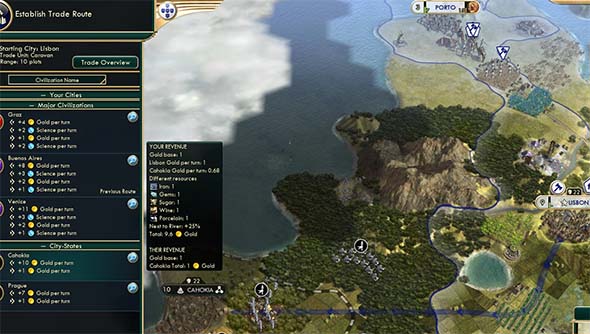
Mercantile city states are excellent early-game trade partners, as they have free access to unique luxuries.
If you can spare the production, Colossus and/or Petra are great wonders to have, as they will give you additional trade routes. Colossus is typically a better play due to Portugal's coastal start bias and the greater overall profitability of sea routes.
Building up your economy should be your primary focus. Build a hefty herd of Workers to be sure to fully improve your lands before you get to the Renaissance There's a free worker available in Liberty if you decide to go down that path, and the Pyramids world wonder will provide 2 more. In the meantime, be sure to research Currency and Guilds so that you have access to Markets and Trading Posts (and Mints if you're lucky) and then focus on the naval branch of the tech tree. Build enough units to defend your trade routes and workers, and to deter any would-be conquerors, but warring should not be a major part of your strategy unless you specifically intend to go for a domination win.
If you reach Optics early, The Great Lighthouse is worth pursuing, as it will eventually grant additional movement and visibility to your Naus, which will make them better at navigating to distant foreign lands to sell their goods. The Merchant great person point will also be helpful, especially if you can build the Lighthouse in the same city as Colossus and the National Epic (and Garden if possible). More merchants will let you build Customs Houses near your trade hub cities, which will further boost their trade value.
Focusing on naval techs will force you to go through the major religious technologies as well, and Portugal's focus on peaceful trade can make it easy to spread a religion if you found one. Most of the founder beliefs can be good for Portugal. Church Property, Initiation Rites, and Tithe can all help augment your income; Peace Loving will boost your Happiness; and Papal Primacy will allow you to spend less money on city states over the course of the game (especially if you get a reformation belief and take Charitable Missions). The Religious Unity or Religious Texts enhancer beliefs will help you spread your religion through your trade routes. Taking beliefs that boost growth can also be valuable, as it will free up more of your population to become specialists (particularly Merchants and Scientists).
Explore! Do it Nau!
Both of Portugal's uniques lie along the Renaissance naval branch of the tech tree (Astronomy and Navigation, respectively). You can use research agreements or Oxford after researching Education in order to try to tech through both Astronomy and Navigation relatively quickly. Once you get these techs, Portugal's game becomes a lot more active!
Immediately begin building Naus in your coastal cities and upgrade your Triremes as you can. Then set sail to explore the world (make sure you continue to protect any vulnerable cargo ships). The Nau has high speed, so you can uncover the map very quickly with a fleet of Nau. Avoid using your Exotic Cargo ability until you have found a civilization or city state on the opposite side of the world, as this will provide the maximum reward. If you focus on sailing along the coastline, you can easily check the value of the Exotic Cargo as you move adjacent to foreign lands. If you happen to be at war, and a Nau gets pinned by enemy ships (or barbarians), then try to use Exotic Cargo before the ship is destroyed or captured (which will be easier if you stay near the coast). Doing so may even give you enough XP to use Insta-Heal and potentially save the ship from imminent death. Selling your exotic cargo on the opposite side of the world will net roughly 300 gold per Nau on standard map settings (depends on the exact shape of the world though - actual results may vary). This is more than enough to cover the upgrade costs from Trireme to Nau or from Nau to Ironclad.
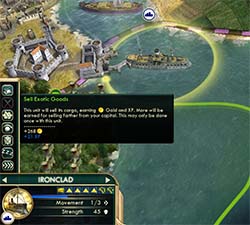
Exotic Cargo is retained when the Nau is upgraded to Ironclad. It's a lot slower though, and will take a while to sail across the world to sell the cargo.
You can also use this gold to purchase other military units or buildings. Don't bother buying any Naus, as doing so is kind of counter-productive to their special ability. Your Naus will also receive between 20 and 30 experience from selling its exotic cargo. Since they don't have any inherent combat bonuses, you can feel free to promote them as you see fit. I generally alternate between Boarding Party promotions or Sentry, and I don't give them City Raider since they aren't effective at attacking cities and Privateers are right around the corner anyway. But during the brief time that your Naus are upgraded to Ironclads, they can be very effective and profitable city conquerors if promoted with City Raider.
Outsourcing happiness
If you timed your research agreements or Oxford correctly, you should be able to power through both Astronomy and Navigation pretty quickly. Navigation will unlock your valuable Feitoria building. This is where those extra workers that you built will really come in handy. A few turns prior to researching Navigation, start looking at what luxuries each city state has available. Make notes of city states that have rare luxuries and the mercantile ones that have the special porcelain or jewelry luxury. Put particular focus on the City States that you don't already have alliances with. Also take a look through your own cities to see what resources they want for "We love the king day" and check if any city states have that resource. Start sending your workers to these city states' lands while still in the process of researching Navigation so that once you tech, you can start building Feitorias immediately.
If you focus on city states that you aren't allied with and which don't have duplicates of luxuries you already own, you'll see a large boost in happiness. The Feitoria also acts as a fort, so you can station units on them in order to protect vulnerable or strategically important city states from potential attack. Make sure you are friends or allies with that city state first though, since fortifying a military unit in a Feitoria still counts as trespassing if you don't have rights of passage. Building the Feitorias on hills will grant extra defense to your unit as well as extra line of sight. If you are trying to help defend the city state, then try to put the Feitorias on tiles that are close to a potential invasion point. Since the Feitoria is limited to coastal tiles (without resources), you are limited in where you can build, so try to find the best spot for your purposes.
Since Feitorias do not cost any maintenance, there is no direct harm in building one in every city state (if possible) - especially if you're keeping your Workers around with nothing to do while you wait to tech to Railroad. Though you can't trade the luxuries that the Feitorias give you, having lots of duplicates will free up any domestic copies of that luxury for trade with other civs and give you insurance in case of one of the following:
- Venice or Austria absorbs the city state
- An aggressive civ (Assyria, Huns, Mongolia, etc) conquers the city state.
Both these events will cause you to lose access to any luxuries that city state's Feitoria was providing.
Use the resource overview to see if you can spare to trade away a luxury.
I have three copies of Furs according to the resource overview ([LEFT]), so I can afford to trade away my only domestically-produced Furs ([RIGHT]) without losing any happiness.
The trade screen does not show non-tradeable resources, and it does not indicate duplicate luxuries given by Feitorias. You'll have to look at the list of available resources in the resource overview before entering the trade screen to see if you can afford to trade away your last copy. I got into the habit of just leaving my resource overview open during the second half of the game so that I would be constantly reminded of how many of each luxury I had.
If you're not going for a diplomatic victory, then it becomes much less important to maintain alliances with city states once you have Feitorias. However, the Feitoria does not give you any of the city states' strategic resources, nor does it grant any of the bonus culture, food, faith, happiness, or military units. You'll have to ally if you want those benefits also.
Commerce is a good policy tree to adopt. The Protectionism policy will grant +2 Happiness for each luxury that you have access to. Combined with the free luxuries from Feitoria, this should provide you with a huge surplus of happiness. Big Ben's discount for purchasing units and buildings in cities will be very helpful. You'll also want to tech to Banking fairly soon in order to get the extra trade route. If you decide to open up Patronage, then the Forbidden Palace becomes a good wonder to invest in. Your Naus should help you to explore the map very quickly, and assuming Polynesia isn't in the game, you have a very good chance at founding the World Congress when you complete Printing Press.
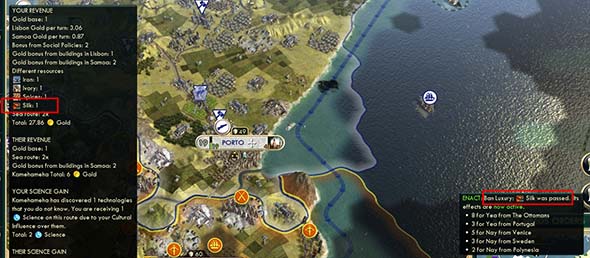
A composite image indicating that banning a luxury via World Congress does not negate that luxury's value towards trade route yield.
You don't have to like me. You just have to give me your stuff
You might think that since Portugal has a unique that focuses on City States, that they are shoe-horned into a diplomatic victory. This is not the case, however. The Feitoria provides you with a copy of a city state's luxuries regardless of the relationship status with that city state. This means that you can even be at war with the city state and still get free happiness if you have a Feitoria in their land. You can use the defensive bonus of the Feitoria to farm XP from a city state that you are at war with. This can give you well-promoted units that you can later use to conquer other players.
Additionally, if you receive a lot of duplicates of luxuries from Feitorias, then you can afford to trade away your domestic copies for sub-optimal deals. This means that it may not be as important to maintain positive relations with other civs.
Through its Feitorias, Portugal will have access to almost every luxury resource in the game, which means they'll have plenty of happiness to support large empires and territorial conquest. If you promoted any of your Naus with City Raider promotions, then now is a good time to upgrade them to Ironclads and try taking some coastal cities. Ironclads have a bonus versus cities that will stack with any promos that you gave them when they were a Nau. Sadly, the extra movement does not carry over, so your Ironclads will still be slow if traveling over ocean.
And since you don't necessarily need the alliances with the city states anymore, you can use your large fleet of Naus to demand tribute from them for even more gold! Just be aware of protection pacts so that you know which civs (potential trade partners) you may anger.
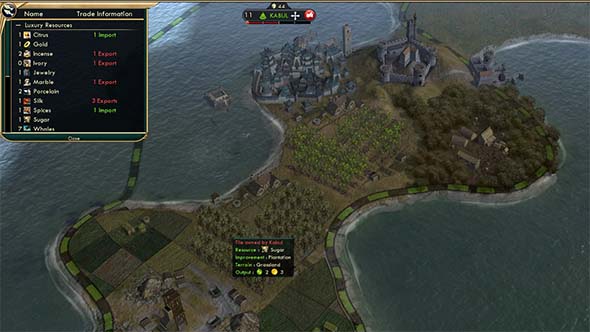
The Feitoria provides the luxury resource even when at war with the CS.
Portugal also needs to watch out for Austria and Venice! Both of these civs can absorb city states, which can effectively neutralize your Feitorias. If you encounter either of these civs early in the game, you may want to consider wiping them out.
Chasing victory
Once your renaissance trade empire is established, you should have enough gold and happiness to be set up for any victory type that you care to go for. You can invest your extra gold in buildings to help you towards a science or cultural win, invest in units for a military win, or start bribing city states to go for a diplomatic win. Since you should have teched to Astronomy and Navigation fairly early, you'll be poised to pick up Archaeology early as well, and you'll have already mapped the world, so you'll know where all the antiquity sites are. You'll also be able to afford to expand into any unclaimed regions of the map, especially if you adopt Order along with the Resettlement [new cities start with 3 extra population] and Skyscrapers [discount for purchasing buildings] tenets. You have enough happiness to afford late-game expansion, and you'll have enough gold to buy buildings to get those new cities productive quickly.
Re-opening the seas: countering Portugal
Being a trade-focused empire, Portugal is not particularly aggressive. Her unique unit does not have any direct combat bonuses, so the only noteworthy military threat from Portugal is that their overflowing coffers allows them to very quickly mobilize new units. Most of Maria's A.I. flavors are middle-of-the-road: so she's not particularly aggressive, nor particularly friendly or loyal. She does favor navies, so expect to see plenty of Naus generating lots of gold for Portugal.
Unlike Morocco, Portugal's trait does not benefit other players directly. You do not gain any additional gold from trading with Portugal, but Mare Clausum also doesn't have an effect on the amount of gold that Portugal will receive from your trade routes, so there's no real reason not to trade with her. One indirect benefit is that she is more likely to have excess gold and income, which means she'll be more likely to be able to afford to buy resources and research agreements from other players. However, since her Feitorias will grant her lots of free luxuries, you shouldn't count on her to buy your luxuries in the second half of the game. The Feitoria might free up some of her luxuries to be traded away though, if you need an extra boost to happiness.
Portugal's fast caravel replacements makes Maria a prime candidate for founding the World Congress assuming that Polynesia is not in the game. So if you antagonize her, you can likely look forward to embargoes or other unfavorable resolution proposals.
Austria and Venice can also pose problems for Portugal, as every city state that they absorb through marriage or bribery is one less city state from which Portugal's Feitorias can provide free luxuries.
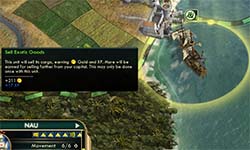
Ottomans using a captured Nau's Exotic Cargo abililty.
Maria is booty-licious!
If you are hostile towards the Portuguese during the Renaissance, then a war with them can be very profitable during this time. Beyond plundering their trade routes and pillaging their improvements, you can also gain a lot of free cash by capturing her vulnerable Naus with your Privateers. You can then use the exotic cargo ability of the captured Naus to earn lump sums of gold, and then (if they aren't promoted enough to be useful) disband them within your own territory for even more gold!
When a Nau uses its Exotic Cargo ability, all players with visibility on that tile will be able to see the flash of Gold and XP. Watch for this. If that specific location is the most optimal spot to sell the cargo, you can lay a trap for any Portuguese Naus that are approaching.
This is a particularly potent strategy for the Ottomans, since all their melee naval units start with Prize Ships and can capture defeated ships.
Take this opportunity to pillage as many of their Feitoria as you can in order to tank Portugal's happiness. You'll need to be at war with the city state in order to do this, so you likely won't be able to pillage very many Feitoria. If the Feitoria is within range of bombardment from an enemy unit, you may want to consider fortifying on the Feitoria first in order to take advantage of the defensive bonus, then have all your movement the next turn so that you can pillage and run away if you must. You can also leave the Feitoria in-tact if you want to take advantage of its defensive bonuses in a siege of the city state. City states aren't particularly good at using the defensive bonuses of the Feitoria, so if you see a strong city state unit inside a fort, you can usually just wait a turn or two and the CS will likely move it.
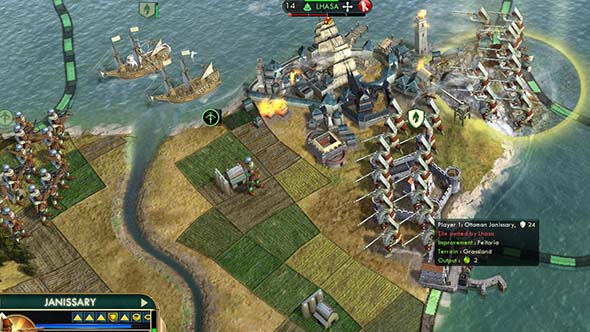
Other players can use Portugal's Feitoria's defense bonus in support of your own seiges of city states.
Discuss this strategy on Civfanatics:
http://forums.civfanatics.com/showthread.php?
p=13112331#post13112331
or on the official 2K Civilization V forums:
http://forums.2k.com/showthread.php?
436441-A-general-strategy-for-Portugal&p=5791051#post5791051
Listen to the discussion on PolyCast, Episode 195, 01m59s (Mar 22, 2014):
http://civcomm.civfanatics.com/polycast/polycast/season8/episode195.mp3